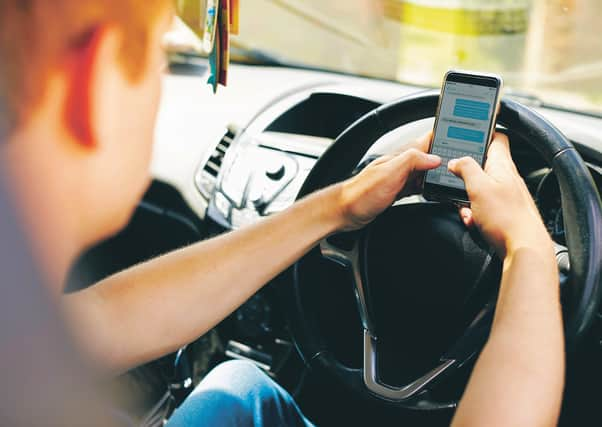Vive la différence! Women outnumbered 11 to one by men in motoring offences


Male drivers caught not wearing seat belts and having vehicle defects outnumbered female drivers by 11 to one.
In addition, eight times as many men were penalised for driving while using a mobile phone than women.
Advertisement
Hide AdAdvertisement
Hide AdMale drivers also outnumbered female motorists in all other motoring offence categories, but by smaller margins.
A motoring group said the figures showed more women behind the wheel would make Scotland’s roads safer.
They comprised cases dealt with in the courts rather than by fixed penalties issued by the police, indicating some may have been at the more serious end of the scale.
A total of 192 men were convicted of seatbelt offences in 2018-19 compared with 17 women, according to the latest Criminal Proceedings in Scotland report.
On vehicle defects, 1,034 male drivers fell foul of the law against 94 females.
Among motorists caught using their mobile phone at the wheel, there were 616 men and 76 women.
For dangerous and careless driving, men outnumbered women by five to one – 2,631 offences against 486.
Some four-and-a-half times as many men as women were convicted of speeding. A total of 7,450 male drivers were caught breaking the limit compared with 1,617 female drivers.
Advertisement
Hide AdAdvertisement
Hide AdThe narrowest margin was in driving under the influence, such as of drink or drugs. Here, some three-and-a-half times as many men were convicted – 2,752 against 806 women.
Neil Greig, the Scotland-based policy and research director of the IAM RoadSmart motoring group, said: “It is clear from these figures that when it comes to the ‘Fatal Four’ priority police enforcement areas – drink, speed, seatbelts and mobile phone use – women are far better behaved on the roads than men.
“More Scottish men have a driving licence than women – 76 per cent versus 64 per cent – but that does not explain this wide disparity in offending.
“What is clear is if more women slipped from the back seat into the driving seat our roads would be a lot safer and less stressful.”
However, Edinburgh University applied psychology and public health lecturer Dr Jessica Hafetz Mirman said men tended to take longer trips, including for work, while women more frequently transport children.
She said: “Men and women also drive different types of vehicles, which can have direct implications for speeding, roll-over risk, and attracting police attention,” Mirman added.
Philip Gomm of the RAC Foundation said that more men might be driving for work and feel under pressure to answer the phone from the office.